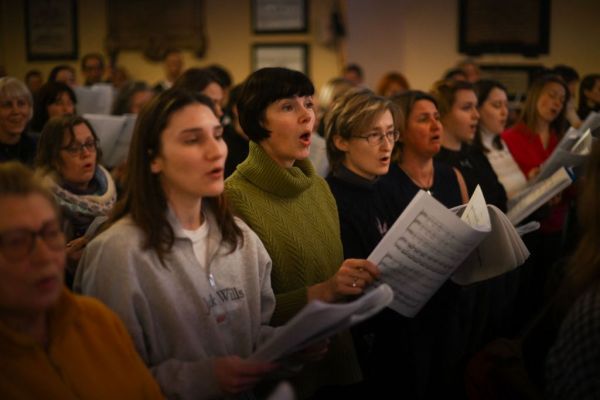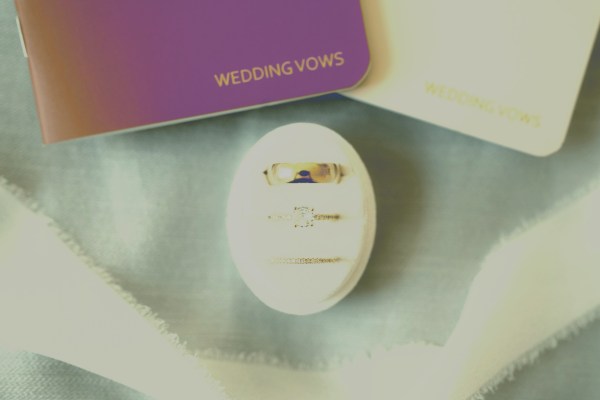Graduation season is upon us. As a literature professor at a Christian university, I’m often invited at this time of year to family dinners celebrating students’ academic achievements—and not long after, I’m sometimes invited to their weddings, too. “Ring by spring” culture, while no longer as pervasive as it once was, is still alive and well. And though it’s most visible at faith-based institutions, the basic dynamic isn’t unique to them: Put young adults in close proximity for four years, and some of them will walk away with diplomas and rings.
Were she alive today, Jane Austen might find the modern American university a fitting setting for one of her novels. Campuses are often equal parts social drama, romantic tension, and economic reality—a perfect cocktail for courtship, or at least intriguing complications. But in recent years, politics have slipped into the storylines, realigning the rules of engagement (pun intended). Because even as some young couples waltz down the aisle, other single romantics are still navigating confusion, resentment, and, to state it as nicely as possible, mismatched expectations about relationships. For young, more traditionally minded women especially, the path to that expected happy ending is feeling less like Austen and more like an unfinished draft—missing the resolution, and quite possibly the romantic lead.
This confusion about young conservative women’s romantic future hasn’t stayed tucked away in library study halls, late-night dorm chats, or even sympathetic women’s literature professors’ offices for that matter. No, it’s also made it into the public square, thanks in large part to viral clips from two conservative commentators: Megyn Kelly and Matt Walsh. Referring to the messaging coming from traditional right-leaning men like Walsh, Kelly said on her show that she often hears from young conservative women that “What’s happening is, they can’t find men,” she said. “They can’t find a lot of young men who want to marry a working woman now. … How did we get to the point that we’re now telling young, amazing conservative women that they’re not attractive if they also work?” Walsh’s response was characteristically blunt: “Men are not generally attracted to ambitious, career-driven women,” he said. “I’ve never once heard a man brag about a woman’s career ambitions. It’s not what men value.”
This raises the question: Who, exactly, are these men? Because many men—my husband included—do appreciate their partners’ ambitions. In fact, one of the first things that drew my husband to me was my love for literature and my pursuit of a graduate degree, and it was he who reminded me of this fact when I showed him the Matt Walsh clip while working on this article. “Don’t you remember me telling my friends how cool I thought it was that you were working on your master’s?” he asked. “That guy’s friends are just that—that guy’s friends.” Meaning: Walsh’s observations are likely derived from who he hangs around with—and that doesn’t always make for universal truths.
The problem is the message sent to young conservative men who listen to Walsh, at least on this issue: Not valuing women’s goals is part and parcel of masculinity, he seems to be saying. By extension, young, ambitious women who seek a like-minded conservative partner are provided a painfully small box to squeeze themselves into, as Kelly suggests, as well as slim pickings on the marriage market.
Meanwhile—and I suggest not coincidentally at all—the tradwife fantasy is thriving online. Perhaps its most famous example is Instagram influencer Hannah Neeleman, a Juilliard-trained ballerina and former beauty queen turned rancher and social media influencer for her brand Ballerina Farm. For her 10 million followers, Neeleman shares lovely, pastoral videos and pictures of herself milking cows, braiding bread, and bathing babies in copper tubs. Her aesthetic is outwardly flawless, her sourdough is likewise always divine, and her children are scrubbed and angelic. (As a counter to this, I admit to owning no cows but enjoying Burger King, having a broken breadmaker, and raising often tangly-haired and even smelly children who get in trouble. That said, I do not admit to having any less love in my life.)
Importantly, what’s left unsaid in Neeleman’s gloriously beautiful videos is the cushion of privilege holding up her platform: Her husband is the son of JetBlue’s founder. Her account isn’t a return to traditional values once had and now regained. It’s elite performance art that most singles straight out of college could never afford.
Don’t get me wrong: I love watching and following Neeleman’s account. Yet the popularity of social media accounts like hers in no way reflects a mass movement of women leaving the workforce to embrace lives of making homemade jam. Instead, I think it reflects a knowledge of what many could never have (and likely don’t want either because of its extremity) but an appreciation for the aesthetics of the “idea” of her life. Followers recognize at some level she represents peak performance of extreme domestic arts. The problem is that when young conservative men point to someone like Neeleman as an ideal marriage partner, they’re not looking for a real partner. They’re looking for a fantasy, one that’s underwritten by money they probably do not have. And, of course, the irony of her wildly successful career as an influencer—building that sort of audience is, after all, a career—should not be lost on anyone.
Nor should one overlook the statistical reality that even attempting to emulate this fantasy is becoming increasingly untenable. As of 2023, only about 27 percent of married mothers with children under 18 are not participating in the labor force—and that number keeps shrinking. At the same time, women now make up nearly 60 percent of U.S. college students, a trend with no signs of reversal. If conservative men are adamant about marrying a woman without a job or college degree, they’re limiting themselves to a dating pool that’s actively shrinking.
While recent polling suggests that Gen Z men are trending more conservative, their female peers are moving in the opposite direction. And at the same time, young women are leaving organized religion in record numbers, often citing rigid gender roles and outdated expectations as reasons for their departure. And while I began this article speaking about young conservative women feeling dissatisfied with their choices, statistics show that men aren’t doing so hot either. A 2023 Pew Research report notes that nearly 63 percent of men under 30 are single, compared to 34 percent of women. Many men report being lonely, uncertain about modern dating expectations, and unsure how to form lasting romantic relationships. If women feel asked to shrink themselves to be loved, many men seem to have the opposite problem: They’re unsure of how to grow into the kind of love they long for.
But if today’s dynamics feel new, a better model isn’t. There’s a long tradition in American life of what scholars call “companionate marriages.” These marriages aren’t built on hierarchy, but instead on emotional intimacy and shared purpose. Historians like Nancy Cott have pointed to Abigail and John Adams as one early example: their letters reveal a relationship exemplified by affection in tandem with serious intellectual exchange. In 1776 as the American Revolution gained momentum, Abigail famously wrote to John, “I desire you would remember the ladies, and be more generous and favorable to them than your ancestors.” She warned that if women were not given a voice, they would “foment a rebellion.”
What she asked for wasn’t his submission (even though she might be labeled a dreaded feminist today!). It was respect, a vision of marriage where liberty and love could coexist. A vision, I like to think, of marriage that I believe led to one like my own.
And yet, the Matt Walshes of the world seem to have forgotten the ladies. Indeed, it’s an odd oversight from someone who often claims to care about preserving the spirit of the American founding. Hypermasculine conservative commentators often verbally hold up tradition while skipping the parts that require genuine mutuality or meaningful sacrifice from men for women who might want to raise children and serve the world in other ways, too. While John was away founding a nation, Abigail was running their farm in every way, from finances to administration, taking on what were traditionally considered men’s roles while raising children (including a future president). She is also considered one of the most well-read first ladies to have ever graced the White House.
In today’s dating landscape, companionate marriage remains possible. Still, it requires honesty and a willingness to see women as whole persons, not achievements in a war to own the libs. Most of the young conservative women I teach want to raise families. Most also have career goals tied to those degrees they’re earning. All have ambitions that deserve the honor of someone else. And the same holds true for the young conservative men I’m teaching, who deserve partnerships that call them to something higher than the limited idea espoused on the internet.
This isn’t a new insight; Jane Austen understood it more than two centuries ago. Her heroines didn’t surrender their intelligence or independence to win a man; they insisted on being loved for who they truly were. Elizabeth Bennet refused Mr. Darcy’s first proposal not because she didn’t want marriage, but because she refused a marriage that didn’t have respect at its core. Austen’s novels remind us that a good marriage isn’t about the domination of any one person over another. It’s about dialogue and recognizing when perhaps you might be the one who has a little too much pride—or prejudice.
Young people deserve a Jane Austen kind of love story—not a Bachelor one. One grounded not in spectacle, but in sincerity.










Please note that we at The Dispatch hold ourselves, our work, and our commenters to a higher standard than other places on the internet. We welcome comments that foster genuine debate or discussion—including comments critical of us or our work—but responses that include ad hominem attacks on fellow Dispatch members or are intended to stoke fear and anger may be moderated.
With your membership, you only have the ability to comment on The Morning Dispatch articles. Consider upgrading to join the conversation everywhere.